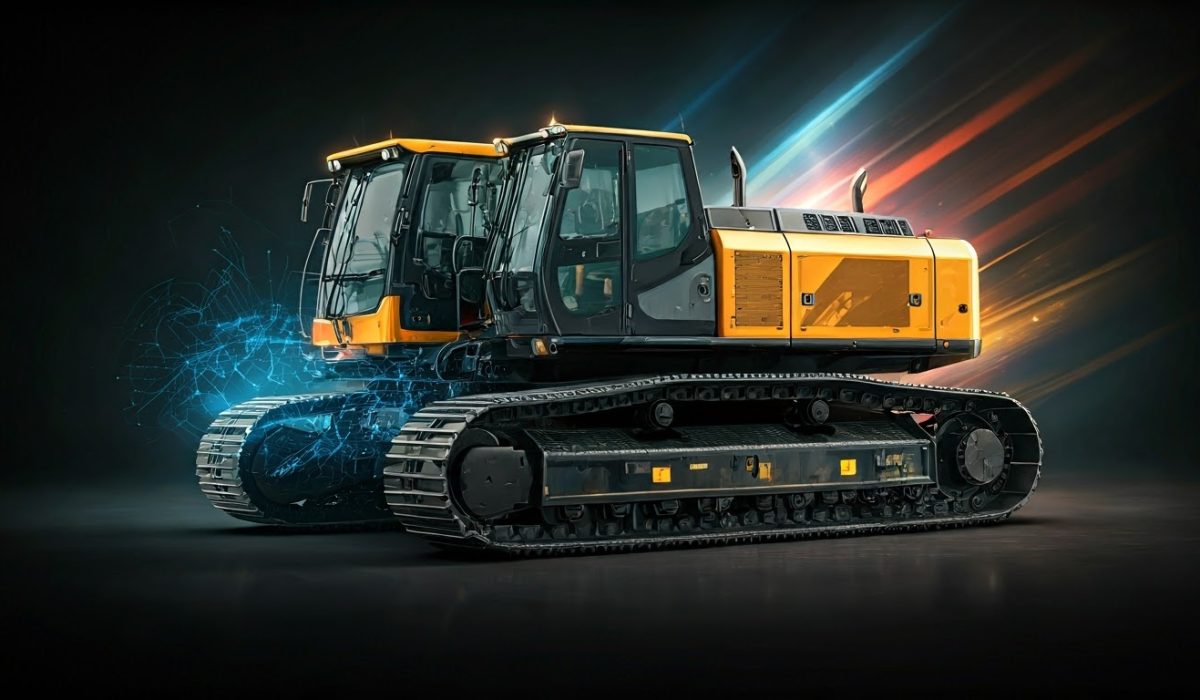Performance and efficiency of a mini excavator depend much on hydraulic systems. Maintaining this system will determine maximum performance as well as equipment lifetime. Service, enhancements, and hydraulic system inspections determine if preventative costly breakdowns and increase of work site efficiency occur. Maintaining, analyzing, and improving the hydraulic system of a mini excavator calls for operator knowledge of tools, construction, and equipment maintenance.
Hydraulic issues like low pressure, fluid leaks, and component corrosion would greatly restrict mini excavators. Usually, these problems cause unusual noises, delayed or nonresponsive motions, and decreased lifting capacity. Regular maintenance helps to overcome these issues, hence the excavator runs under demanding conditions constantly.
Owners of compact excavators and members of maintenance teams employing a thorough checklist will find maintaining hydraulic systems easier. This checklist will let users increase performance and reduce downtime by means of hydraulic system inspection and maintenance.
Know Everything There is to know about Hydraulic Systems
Pascal’s principle guides the hydraulic systems of mini excavators: pressure supplied to a confined fluid is transmitted unaltered. Usually propelled by pressurized hydraulic fluid powered by hoses and cylinders, oil, Mini excavators move accurately and elevate large things. Perfect conversion of hydraulic energy into mechanical energy is made possible by bucket and augers for the system.
- Operation Process: Hydraulic systems of a mini-excavator operate on hoses, valves, reservoirs, cylinders, and hydraulic pump. The hydraulic pump pumps fluid from the reservoir into the hydraulic lines to build pressure. Pressure translates in hydraulic cylinders into linear motion. Direct fluid flow valves provide machine action control for operators. Component inspections and routine maintenance help to prevent hydraulic problems like leaks and inefficiencies.
- Cost Mechanism: Safety, cost, and hydraulic system performance maintained in excellent condition ahead. Component optimization lets operators increase cycle times and lifting capacity. Early identification of prospective problems also assures regular maintenance, thereby preventing costly repairs and downtime. Often times, monitor fluid levels and conditions to prevent low viscosity or contamination creating pump failure.
- Performance Maintenance: Maintaining the life and performance of a Mini Excavator calls for knowledge of hydraulic system inspection, maintenance, and optimization. Knowing the key parts and their applications will enable owners and professionals to assess and preserve hydraulic systems in perfect functioning condition. Giving maintenance first priority enables customers to minimize hydraulic problems and provide consistent performance under many running conditions.
Regular Inspection Checklist – Custom Calendar for Inspections
If mini excavators are to operate as they should, their hydraulic systems must be frequently inspected. Every day inspections should include hydraulic component condition, fluid levels, and leaks. Monitoring hydraulic fluid levels may assist to prevent overheating and low pressure. Little leaks around hoses and connectors might also indicate more major excavator issues. This helps to prevent aggravation of problems.
- Weekly Inspection: Weekly should be hose, fit, and connection checks. Hoses showing wear, breaks, and abrasions may be compromised. Insecure fittings and connections might let fluid leak and reduce hydraulic efficiency. Find odd hose bulges pointing either toward increasing or decreasing pressure. These proactive ways to excavator performance increase hydraulic system reliability.
- Monthly Inspection: The monthly hydraulic fluid and filter check should be more comprehensive. Search for and remove hydraulic system obstructions. Requirement for hydraulic fluid tests include consistency and color. Replace burned or black hydraulic fluid. Consistent premium hydraulic fluid maintenance improves hydraulic component life and enhances mini excavator performance.
Using this regular inspection checklist can help owners and operators of Mini excavators improve output and reduce unplanned breakdowns. By keeping preventative tools under constant use, one may avert costly repairs for minor issues.
Servicing Your Hydraulic System
Keeping up the hydraulic system will enable your mini excavator to run as it should.
Process to change hydraulic fluid and first and most crucially filters:
- After first parking the mini excavator on level ground, switch off the engine. Move spent hydraulic fluid from one container to another using the reservoir drain plug. Investigate leaks using a funnel.
- Once empty, use a filter wrench to remove the old hydraulic filter. Match the mount of the filter perfectly. Top the reservoir with hydraulic fluid then change the filters using your equipment maintenance calendar.
- Air bled the hydraulic system once fluid and filter changed. Air could create performance disruption and problems with hydraulic lines. To bleed the system, raise the boom and extend your arm completely.
- Spend some time in these poses; then, down, disengage. This releases trapped air via the return line on regular intervals. Hydraulic action should continue until reservoir bubbles disappear. This decision controls the smoothness and sensitivity of a little excavator.
- Choose hydraulic oil with great care. Type of hydraulic oil used and operating circumstances define viscosities and additives. Early hydraulic component damage, poor lubrication, and overheating might all be caused by wrong fluid.
- See the guide with mini excavator oil recommendations. Your machine can demand for low-viscosity, cold oil for optimal flow. High temperatures might call for high viscosity oil to prevent thinning. Reaching these standards extends hydraulic system lifespan and performance.
Identifying Common Hydraulic Problems
The hydraulic system of your mini excavator may be fixed and upgraded with bleeding air, hydraulic fluid, filters, and the correct hydraulic oil. Regular maintenance keeps Mini excavators in good condition and enables them to be troubleshooted.
Common and most likely influence mini excavator performance are hydraulic leaks. Clear fluid beneath the machine, moisture around hydraulic connections, or an odd hydraulic fluid level decrease also point to hydraulic leaks. Leaks might result from outdated seals, loose couplings, or hose damage. Early identification of problems in regular hydraulic component maintenance helps to prevent costly repairs.
Many running noises might indicate hydraulic system problems. A grinding or whining sound might suggest either insufficient hydraulic fluid or air. Many times, these noises point to poor performance. Parts or polluted hydraulic fluid might cause jerky or sluggish motions. Track these acoustic waves to assess hydraulic efficiency and fast response.
One should carefully check slow hydraulics. One may find traits in low pressure and delayed response times of contaminated hydraulic fluid. Invest in filters for fluid blocking. Should no obvious problems develop, look for wear on the hydraulic pump and cylinders to limit performance. Regular maintenance and fluid refills rely on each other as longer hydraulic system running depends on them.
Tips for Improving Hydraulic Performance – Rules of Stress Hydraulic Performance
Your little excavator’s hydraulic system may become better with some imaginative tweaks and procedures. Starting with hydraulic pumps, cylinders, and valve changes, one may go through More efficient hydraulic pumps, for example, increase flow rates, therefore boosting operational responsiveness and power. High-pressured hoses help to distribute hydraulic fluid better and help to lower leaks.
Constant maintenance determines hydraulic performance. Regular inspections help staff members to understand hydraulic system wear and tear analysis. Low hydraulic fluid levels should be under continuous observation as they may generate friction and overheating. Regular filter cleaning or replacement helps to reduce pollutants from entering the system, therefore reducing component failure and maybe performance loss.
Furthermore, enhancing hydraulic systems is their great operating and storage capacity. Even in non-operation, miniature excavators should be kept dry and clean. Furthermore suggested to be concentrated on gradual operation of the equipment is to avoid quick movements stressing hydraulic components. By reducing hydraulic system load by running the machine at its rated capacity, one increases its longevity and enhances performance.
Mini excavators, owners might improve their hydraulic systems by changing parts, keeping them maintained, and using appropriate running and storage techniques. These methods increase the lifespan and performance of machinery, so constructing projects find reliability.
Safety Precautions During Maintenance
Maintaining the hydraulic system of a Mini Excavator calls for safety and correct PPE. Among quite crucial safety instruments are big components, steel-toed boots, splash-proof eyewear, and hydraulic fluid-resistant gloves. Work with diminishing item surroundings using a heavy helmet. Appropriate fit and quality of safety gear may help to significantly reduce maintenance related accidents.
Dealing with hydraulic fluids calls great care. Leaks in hydraulic fluid should lead to slips and falls; so, clean them immediately. Having hydraulic fluid, one might consider using cushions or absorbent mats. To capture spills, use a funnel; label containers to avoid confusion. Moreover, local advice on the disposal of outdated hydraulic fluids should help to minimize environmental harm.
Safety Ranges Used in Industry: Manufacturer instructions call for hydraulic system maintenance carried out as recommended. These guidelines include component maintenance, tool choice, hydraulic fluid for your particular kind of small excavator. One guarantees best operating performance and helps to maintain equipment integrity by using these rules.
Ignoring manufacturer recommendations may void warranties or call for costly repairs brought on by poor handling or maintenance. Following manufacturer advice and reading the operator’s manual will help to increase safety and maintenance performance.
Professional Help vs. DIY Maintenance
Expert repairs for a hydraulic mini-excavator provide dependability and safety. Changing hydraulic performance, strange noises, or consistent leaks might indicate a more complex problem. Low hydraulic fluid levels might point to internal component failure or hard-to- locate significant leaks during regular maintenance. See a licenced expert to ensure accurate diagnosis and stop further harm.
Call in a hydraulic professional for more difficult issues. Improved diagnosis tools and professional understanding help them to identify and fix problems. One might evaluate under technician control valve adjustment or hydraulic pump performance. Their knowledge of product standards ensures repairs meet specifications, therefore improving performance. Knowing this helps to reduce costly hydraulic component repair mistakes.
Usually, one should decide whether to work with a professional or do it oneself depending on cost. While more complicated repairs require time and money, routine maintenance and inspections could save money. Untrained hydraulic system service technicians may cause more damage, thereby increasing repair expenses. Professional assistance assures optimal performance and helps to prevent further issues, thereby saving money over time even if it seems costly.
Knowledge of any Mini Excavator owner should include maintenance, updating, and hydraulic system examination. One also learns about their constraints. Usually, enough is home fluid level monitoring and filter maintenance. Professional monitoring is vitally needed if hydraulic system integrity and performance are to be maintained throughout major component or repeated repairs.
Conclusion
Regular maintenance and hydraulic system inspections for your Mini Excavator will help it to run at least and withstand inexpensive repairs. Ignorance of maintaining the hydraulic system of the excavator may cause component damage, leakage, and inadequate fluid flow. Following the checklist will enable you to investigate, repair, and improve the hydraulic system of your mini excavator thereby extending its lifetime and performance.
Daily, weekly, monthly maintenance calls for the checklist this website provides. This approach will allow early diagnosis and fast reaction. Maintaining best hydraulic system condition improves mini excavator performance, reliability, and safety. Maintaining excellent condition of your equipment enables you to concentrate on these features, thereby simplifying construction projects.





